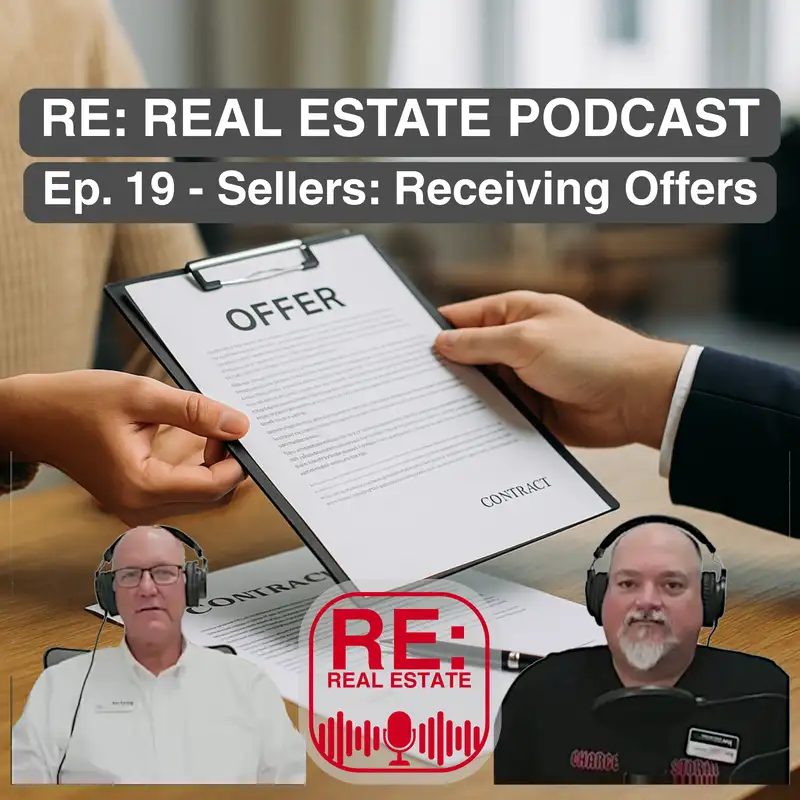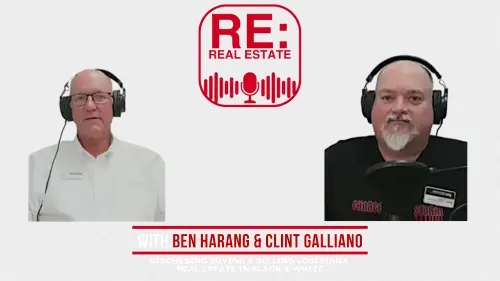Ep. 19 - Sellers: Receiving Offers
Clint C. Galliano (00:24)
Hey everybody. We're back with another episode of the RE Real Estate Podcast. I'm one of your hosts, Clint C. Galliano, Realtor, and joining me is Ben Harang Hey Ben, how you doing?
Ben Harang (00:42)
Man, I'm doing terrific. Good afternoon, man. How you doing?
Clint C. Galliano (00:45)
doing wonderful. What are we talking about today?
Ben Harang (00:50)
Well, I think we're talking about how to handle offers when we receive it on a property we have listed file sellers.
and the importance of terms of the offers and not just what the price being offered is. So I'll let you start and we'll jump in back and forth and we'll see how it goes.
Clint C. Galliano (01:20)
So when I'm receiving offers on a property,
If it's just a single offer and we don't have a whole lot of activity, I mean, we handle single offers and multiple offers fairly similar. There's something we do a little differently when we have multiple offers, but mainly we review the offer, figure out all of the terms. So price is one.
the type of financing, whether it's cash, specific type of loan, things like that, any type of financial terms and conditions. So that'll be if the seller is asking for any, I'm sorry, the buyer is asking for any seller paid concessions like closing costs and things like that.
The other things we look at is any additional terms and conditions. So that would be termite inspections, specific.
specific things that they may want to add in like inspecting the sewage treatment plant or septic tank. Those are usually handled by an addendum. Another thing would be the inspection period. The other thing, and this is actually almost upfront on the purchase agreement, would be what other additional items
that are not considered part of the purchase, but are asked to remain with the house. I can't remember the exact term, but basically things like refrigerators, washers, dryers, things that are not fixtures that aren't attached to the home. know, look, see if they're asking for anything like that.
And so those are some of the main things we look at. Ultimately, we want to make sure or provide the seller with a rough idea of how much money they're going to net from that offer.
and it gets really important when you're looking at multiple offers because you may have an offer for a high price but then they're asking for a lot more money back and a lower priced offer may net the seller more money just because of the different terms and conditions.
Ben Harang (04:12)
Right. all of the terms and conditions are important. People tend to focus on price. But if somebody's selling their house for either to take a new job or to kids go to another school, if they're moving out of town and kids need to start school, the timing of when the offer can close
It may be as important or more important than the sales price if it's close. So I don't get hung up on the price. We certainly respect the price, but whether it's cash or financing, I try to do a little background work before I present an offer, calling the buyer's lender, see how.
kind of pre-approval process they went through if it was just a cold call and they put a mirror in front of their face to see if they could, if they were breathing and they said, well, I think I can get you a loan or if they have copies of the documents they need. What level of pre-approval did they get? Is it, you know, credit score, is is the credit score at the minimum level for the home product or is it credit score of something we don't have to worry about because it's way above
the required credit score. So I go through it and develop a personal opinion about which offer I think has a better chance to close in the event of a multiple offer. And with a single offer, I also try to develop the probability that it's going to close based on my conversation with the buyer's agent, the lender.
Just to kind of get a gut feeling, there's nothing perfect. It's not guaranteed. But if the buyer is well qualified, the buyer's agent is on top of it, and they seem to know what they're doing, we have a better chance of closing something like that. the buyer's agent says, I don't know how we're going to get this closed. We're at the bottom of the
credit score, we're trying to get to 620 and it's 600 and it's, uh, they don't have any money in the bank and they need everything paid for. And I take all of that into consideration and I don't make the decision, but I share with my client the, with the likelihood of a good outcome is.
Clint C. Galliano (07:01)
given the pros and cons.
Ben Harang (07:03)
Yeah, yeah, and let them make the decision. But at the end of the day, develop, we do it individually, we develop a professional opinion about what we think, what's good about the offer, what's not, and what's the chances of it actually closing. Because if it doesn't close, it doesn't matter what the offer was.
know, it also could be $100,000 more than you want if we can't close it. It doesn't matter.
Clint C. Galliano (07:38)
Another one that I've seen is where, and this is for a multiple offer situation, where we'll get two or three offers and a couple of them will be right around list price and one will be $10,000 $15,000 over but then asking for $11,000 in closing costs. And it's like, all right, that person doesn't have any cash reserves.
Ben Harang (07:59)
Mm-hmm.
Clint C. Galliano (08:05)
and they're offering way over and hoping that we'll accept it based on the offer price and then be stuck because we're already well into the process when the home doesn't appraise for that amount. And that we'd have to accept and come down on the price.
Ben Harang (08:18)
Yeah, it is
What we don't want to do is let a qualified buyer go and pick a problem buyer that is going to struggle to close. Those conversations to have with the seller are not fun. mean, you take it to an extreme, but we accept an offer because it's the only one we have. The buyer struggles. The buyer wants the occupancy the day we close.
The sellers with three kids do everything they need to do to get out of the house. And they're out of the house, they're literally, they rented a house or they're on their way across country or whatever. And we get a phone call, well, we can't close, buyer doesn't have any money. Like, no, that's not acceptable. Those conversations should never happen. They do, but it...
You need to do everything. We need to do everything in our power to make sure that doesn't happen. Because now those people are really in a bind. The ones that moved out and thought they were moving on with their life because we were going close at 10 o'clock tomorrow morning. Because the lender said we're going to close at 10 o'clock tomorrow morning. And that is the value of a local lender. I'm going get on a soapbox here for a minute, about that. I've had that happen once or twice to me.
And it was never a local lender that did it. It was an online lender. I'm not going to give anybody a name, but was online lender only. Don't know where they located. I can't talk to anybody. They don't answer the phone. don't respond to emails. And they just tell us no. The day we're supposed to close, the day before we're supposed to close. A local lender, there's somebody I know, I can go to their office. We can sit down. They have to look me in the face and tell me what happened.
They probably are not going to be in a position to do that anyway because they don't lie to me. know, some people just don't tell the truth. And I find it more with the big online stuff. They take in everything they can and the ones that they can't close, they don't worry about it. They just move on to the next one. But that's people's lives we're dealing with when something like that happens and we don't close. So I take that personal.
Clint C. Galliano (10:47)
local
lenders will, if something looks like it's starting to go bad, they'll reach out and say, this is going on. How do you want to handle it?
Ben Harang (11:01)
Mm-hmm. We don't want the sellers to move out yet because we have some issues, you know. Hopefully we can get through it, but let's just kind of put everything on pause for a minute and give us a chance to work it out. And I'd much rather have that conversation than the conversation with somebody's worldly possession in a U-Haul truck 50 miles from where they thought they just sold the house and they have to turn around and unload that truck again. That's just not something I want to do.
Clint C. Galliano (11:34)
Yeah, so.
Ultimately, we would try and develop the best offers for the sellers and go through and demonstrate to the sellers where what we feel is the best offer. If there's multiple offers, if it's a single offer, then, you know, and it's a crap offer, then you can say, hey, this is a crap offer.
I wouldn't advise accepting it. I would advise countering it, saying, depending on whatever terms they offer, come up with a counter that's more acceptable and advantageous for the seller. And we're not looking to screw anybody over or anything, but we're trying to get what's equitable for the seller based on the property.
And ultimately, that's just all there is about it.
Ben Harang (12:47)
Yeah, so at the end of the day, the number that's offered as far as the price is concerned is important, but it's not the end all. The closing date to meet a job deadline or a school deadline, whether or not it's subject to an appraisal, what kind of inspections it's subject to, what kind of lending it's.
subject to all of those things play a factor in the quality of the offer. know, and somebody will say, somebody with cash will come in and say, I'm gonna offer you 15 % less than it's listed for, but his cash will be closed in two weeks. I don't summarily dismiss that. You know, if we know somebody can close, it's, we're gonna, I'm gonna do everything I can to get the price.
It's close to what the seller wants. But at the end of the day, if they're looking at a job deadline, which doesn't come into play as far as what the buyer knows about them, but the seller and I know why they sell in the house. Instead of 15%, they might take 390 instead of 400 or 375 instead of 390 to get the deal done and they can move on with their life.
People are selling the house for a reason. They're not doing it just because they like to move. Because moving is a pain in the neck.
Clint C. Galliano (14:22)
Who likes to move?
Ben Harang (14:24)
Some people do apparently, but I sure don't.
Clint C. Galliano (14:28)
You
Ben Harang (14:31)
So, all right, I think we covered that one pretty good, Clint.
Clint C. Galliano (14:35)
Yep, I think so.
If y'all have any questions, go to rerealestatepodcast.com and look for the Ask a Question link and send us a question. We'll try and answer it on the podcast, on a future podcast. Otherwise, like, comment, share, let your friends know about it.
watch it wherever you want to watch it or watch it on YouTube or listen to it. You can also watch it on Spotify or you can listen to it on your favorite podcast app or player or wherever you want. We're pretty much everywhere that podcasts are.
Ben Harang (15:25)
And if you know somebody that's wanting to buy or sell their house, send them a link to the podcast. We feel like we have a lot of good information. You have to tolerate the sound of our voice and the way we look to get to it. But I think the information outweighs that. At the end of the day, we're to help people buy and sell real estate. That's what we do. We think we do it well. If somebody's in that market,
give them, send them a link and let them see for themselves and see if they're interested in reaching out. So I believe that's it Clint.
Clint C. Galliano (16:06)
All right, Ben, another one in the can and we'll do it again soon.
Ben Harang (16:11)
All right, y'all have a good one. Thanks.
Clint C. Galliano (16:15)
See you, Ben.
Ben Harang (16:16)
See you Clint.
Creators and Guests



